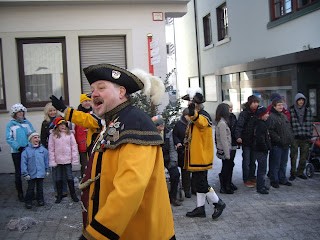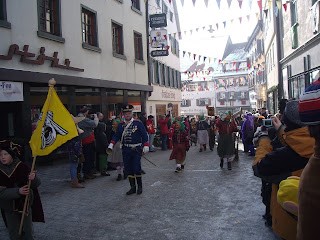A Random collection of My previously published texts in English
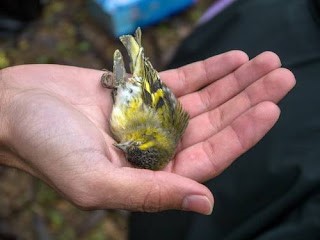
The Plight of Migratory Birds
Published on 3/26/20 4:10 PM
So, while the whole world right now is slowly grinding to a standstill in an ill-conceived attempt to curb the spread of a virus, let's direct our attention to another danger - lethal not to us humans, but to our feathered friends.
While we humans are now supposed to postpone all travel and self-isolate indoors, millions of birds leave their winter quarters to migrate to their breeding grounds for raising the next generation.The time when the long distance air travelers, big, small, and very small, start to arrive in the neighborhood, in my backyard, is a joyous one for me.
In my backyard snow is still on the ground in places, but the bird feeders are now frequented by the customary spring arrivals: red-winged blackbirds, grackles, starlings, and goldfinches are now joining the black-capped chickadees, the many cardinals, the song sparrows, different species of woodpeckers, nuthatches, juncos, bluejays or mourning doves that have, for one reason or another, stayed around for all of our harsh and bitterly cold winter.
Just this very afternoon I heard the happiest sounds of them all coming from the formation of Canada Geese flying overhead. It seems nigh impossible for them to fly in silence. They are a noisy bunch, busily quacking and honking incessantly when airborne. They are equally interesting to watch when chilling on the water.
Just this very afternoon I heard the happiest sounds of them all coming from the formation of Canada Geese flying overhead. It seems nigh impossible for them to fly in silence. They are a noisy bunch, busily quacking and honking incessantly when airborne. They are equally interesting to watch when chilling on the water.
Some Mallards have already scrambled up the embankment and onto my lawn. I can hardly wait for the annual spectacle of them exploring the ground below the bird feeders, first in couples and later with their respective families.
Another summer resident of the bay just flew by as well: the Blue Heron sometimes can be observed standing immersed belly-high in the shallow water waiting for his lunch to swim by in pouncing distance.
The muskrat is already navigating his way around or under the last ice patches as well, and soon the beavers will surface, too, gnawing the bark off the thick trees as high as they can reach.
Slowly over time, the ground below the hanging feeders reveals more of a thick layer of seed hulls, and the squirrels are busy looking for some edibles among the discarded waste.
It is such a joy watching the many birds, bigger or smaller ones, feed on the seeds offered, flit through the air, sit by the still ice-covered water and preen, or squabble over the best access to the food on offer, and releasing their song into the spring air.
Another summer resident of the bay just flew by as well: the Blue Heron sometimes can be observed standing immersed belly-high in the shallow water waiting for his lunch to swim by in pouncing distance.
The muskrat is already navigating his way around or under the last ice patches as well, and soon the beavers will surface, too, gnawing the bark off the thick trees as high as they can reach.
Slowly over time, the ground below the hanging feeders reveals more of a thick layer of seed hulls, and the squirrels are busy looking for some edibles among the discarded waste.
It is such a joy watching the many birds, bigger or smaller ones, feed on the seeds offered, flit through the air, sit by the still ice-covered water and preen, or squabble over the best access to the food on offer, and releasing their song into the spring air.
For some years now, the numbers of song and other birds world-wide are dwindling more than ever before due to habitat reduction, habitat poisoning from industrial agriculture, as a consequence of changes in weather patterns. They are also killed by wind turbines, by collisions with cell and radio towers or by slamming day and night into the windows of high-rises. According to the latest numbers compiled by Bird Life International, one in eight birds is in danger of extinction.
The biggest danger to wild birds, however, is not wind turbines or any of the other aforementioned factors. The biggest danger to birds world-wide are cats. This fact is usually vehemently disputed by cat owners. Yet, the numbers speak an undeniable truth: in the continental US alone, roughly 3 billion birds are killed by pet cats that are allowed to roam freely. That's billions, not millions. In Canada estimates run between 100 and 350 millions annually. These are numbers that boggle the mind.
The biggest danger to wild birds, however, is not wind turbines or any of the other aforementioned factors. The biggest danger to birds world-wide are cats. This fact is usually vehemently disputed by cat owners. Yet, the numbers speak an undeniable truth: in the continental US alone, roughly 3 billion birds are killed by pet cats that are allowed to roam freely. That's billions, not millions. In Canada estimates run between 100 and 350 millions annually. These are numbers that boggle the mind.
At the moment, however, let's focus on the murder of migratory birds in Europe. Yes, murder. How else would you call the indiscriminate, rampant, merciless killing of small creatures for food and pleasure?
It is particularly gruesome and steeped in tradition in Southern Europe, chiefly in Italy and Malta, but also in Spain and in Southern France. There, so-called hunters use a really heinous method for their perfidious bird-catching: sticks covered in glue. The birds die in agony. To wit: "In Italia ogni anno vengono uccisi illegalmente più di 5 milioni di uccelli, un vero e proprio massacro che non risparmia nessuno, dalle cicogne ai pettirossi." (Every year in Italy, more than 5 million birds are killed, it's a veritable and real massacre that spares none, from storks to robins.)
It is particularly gruesome and steeped in tradition in Southern Europe, chiefly in Italy and Malta, but also in Spain and in Southern France. There, so-called hunters use a really heinous method for their perfidious bird-catching: sticks covered in glue. The birds die in agony. To wit: "In Italia ogni anno vengono uccisi illegalmente più di 5 milioni di uccelli, un vero e proprio massacro che non risparmia nessuno, dalle cicogne ai pettirossi." (Every year in Italy, more than 5 million birds are killed, it's a veritable and real massacre that spares none, from storks to robins.)
In Southern European tradition, nature, and wild animals especially, have been regarded as inferior to humans and, as a consequence, wildlife is worthless and at everyone's disposal as they see fit. Wild animals, birds in particular, are killed, maimed, and slaughtered quite legally, or, where this is prohibited by law, the law is disregarded by thousands of poachers who are not prosecuted. La chasse à la glu is a wide-spread and long-standing provençal tradition. The tiny birds they hunt are plucked and cooked, often in Armagnac, and eaten whole, including feet and bones. Only the beak is left. Often they are also baked in a pie.
Another country where around 200,000 birds are killed annually is Serbia. People there shoot, poison or trap migratory birds without mercy. In fact, such practices are wide-spread in all of the Balkans.
Luckily, there are organizations that try to put an end to these barbaric practices. Pan-European as well as local associations are hard at work to change people's attitudes and petition governments to make the annual slaughter and maiming an illegal act. (e.g. euronatur.org; La Lipu in Italy).
Another country where around 200,000 birds are killed annually is Serbia. People there shoot, poison or trap migratory birds without mercy. In fact, such practices are wide-spread in all of the Balkans.
Luckily, there are organizations that try to put an end to these barbaric practices. Pan-European as well as local associations are hard at work to change people's attitudes and petition governments to make the annual slaughter and maiming an illegal act. (e.g. euronatur.org; La Lipu in Italy).
Read about The Killer at Home on NPR news of April 18, 2020.
Sometimes life throws a monkey wrench
Published on Feb. 26, 2010
My boy, clad in white muslin socks, muslin underwear and one of those open-back gowns which make you feel uncomfortably exposed, is being wheeled towards the operating theater. His black locks are hidden under a ridiculous green cap. He doesn’t want to show any fear, but his pale face and wide-open eyes betray him. I’m walking along the stretcher holding his hand, and I feel a tight squeeze. I squeeze back, trying to exude confidence.
His smashed-up right leg doesn’t bother him right now; the pills he had to swallow a few minutes ago are working. Soon he’s going to be under general anesthesia while the chief surgeon himself will be screwing the split tibia and sewing the ripped tendons back together. Small miracle: there are no severed nerves; he still has sensation in his foot.Presently, the nurse motions me to stay back. I have to let go of his hand. A last squeeze, a kiss and a tight hug.
I’ll be there when he wakes up in the recovery room. At the moment, though, I’m sitting in the waiting area, trying to concentrate on the work I brought along. Yet, thoughts of things going wrong are worming their way into my brain. What if this 16-year-old boy, who spends most of his free time outdoors on his bike or doing other sports, will come out of this with restricted mobility, with a stiff leg, with a limp?
Resolutely I chase away these useless thoughts and concentrate on the positive instead: he didn’t hurt his head or spine, he is otherwise healthy. Yes, this will put him out of commission for a while but, with time, he will fully recover. This last one I keep repeating like a mantra until word arrives that the operation is done, and my son is in intensive care until he wakes up.
The doctors assure me that everything went well and chances for a full recovery are, indeed, excellent. A wave of relief washes over me.
I rush to the ICU. No problem being allowed entry right away. With 123 beds this hospital is comparatively small, yet specifically their surgical ward specializing in general, trauma and visceral surgery enjoys an excellent reputation.
Visitors can move around freely; there are no restrictions as to visiting hours, and for a small fee it’s even possible to stay there with your sick loved one full time, to spend day and night right by their side. This option is often used by mothers with sick small children.
My boy, meanwhile, is lying there, pale with dark circles around his eyes, a drip tube attached to his arm. I’m looking at this dear child of mine, so grateful for the gift of this boy, so full of deep love for him. I lean forward and plant a kiss on his forehead, run my fingers through his curls and for once he doesn’t object because he’s in a deep sleep, oblivious to anything that goes on around him.
After a long while he awakens and manages a still feeble smile. Nurse comes and wheels him back to his cheerful, sun-drenched hospital room, and so begins the long journey towards restoration of his active life.
The Good, the Bad, the Ugly, and the Beautiful
Published on 2/17/10 11:56 AM
It's six months now almost to the day that my son and I arrived in Germany to start our new life away from our Canadian home. Time to take stock, I guess, to have a look at the good and the bad, the ugly and the beautiful as well as the unexpected.
Has Germany turned out to be everything we expected? Well, taking into consideration the fact that it was not my first choice for a European base, things have turned out quite well. Especially for Max.So, let's classify things into categories: thumbs up, thumbs down, thumbs straight with potential to move either way.
Thumbs up:
The WEATHER. After almost three decades of six months or more annual winter time with long periods of eyelid-freezing-shut-and-icicles-breakin-off-your-breath-every-time-you-open-your-mouth temperatures, it's sweet compensation (for the German speaking readers: ein innerer Reichsparteitag, aber noch ohne Fackelzug) to pity the uniformed soul who complains about shoveling 5 cm of snow and about how excessively cold it has been this winter with temps hovering at minus 5 for more than two weeks. Just think that tomorrow, Feb. 18 (!!) we'll get 10 plus!!!.
O.k., there is the sunshine issue.
Thumbs down for that. Too much grey, not enough brightness. Often, there is thick fog wafting at street level in the mornings and after sundown in winter and fall.
Thumbs down for bureaucracy. Way down. If you even want to bat an eyelid you have to have certification for doing so. You want to apply for a job? Better search for your high school leaving certificate. Never mind that you are a postgraduate of several universities, have had a long and successful career. They want to see how you did in high school!
Thumbs way up for beauty. Landscape-wise. If you are susceptible to such things.
Have you ever been on the north shore of Lake Constance on a clear and sunny afternoon looking across, straight into Switzerland? Seen the snow-capped, rugged alpine peaks of varying heights and hues, just a stone's throw away? O.k., so you would have to be an Olympic caliber stone thrower, but you get the drift....
Thumbs down for variety of restaurant food. Coming from Montreal, I'm simply spoiled in terms of quality and variety of places to eat out.
Well, to be fair, we are in a rather rural area, and even in this comparatively tiny town there are several Turkish eateries, not counting the half-dozen or so Turkish fast food joints, some really outstanding Italian restaurants with superb fare, a Greek one, quite a few decent traditional German places, and an authentic Chinese restaurant run by what must be the only Chinese person in a 40-mile radius.
But, there is no sushi bar within a reasonable distance, and I am starting to suffer serious sushi withdrawal symptoms....
Burning of the Spirit of Fasnet
Published on Feb. 16, 2010
After this beautifully sun-drenched (for a change) winter afternoon had faded into a crisp, starry night, I made sure my camera was ready and headed out again for the climactic event of the day, the burning of the spirit of Fasnet.
All townsfolk were assembled in the market square when the afternoon parade came through in reverse order, preceded by the pounding drums of the music corps. Many of the marchers carried torches unless they were holding on to their costume's accessories: sticks, lances, bells, and inflated pig's bladders attached to the end of a stick by a string. Those things were used to randomly hit unsuspecting onlookers over the head.Slowly, the parade and the bands filed into the middle of the market square, and then the Spirit of Fasnet in the shape of an oversized woman, a witch in fact, appeared high atop a wagon pulled by a shiny tractor. Here's where things started to turn eerie...
A judge from times past climbed onto the wagon and read the indictment to the assembly. In long-winded verse the spirit of Fasnet was accused of spreading sin and mischief, seducing otherwise righteous citizens into debauchery and generally wreaking havoc. That's why an end had to be put to her doings and the spirit was to be burned.
He put a torch to the spirit, and while the flames devoured the effigy, the judge further admonished the people to repent and to return to the straight and narrow as of midnight tonight.
The crowd started singing and swaying and lamenting the impending end of merrymaking before dispersing.
No, most did not go home but directed their steps towards the town's pubs and bars instead. After all, this is the last night before the start of 40 days of fasting. Does anyone actually follow these religious rules for the time leading up to the Easter holidays ?
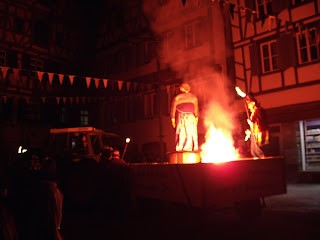
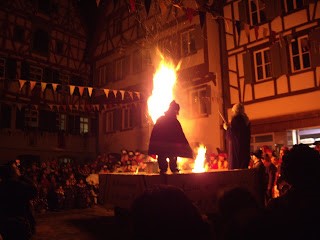
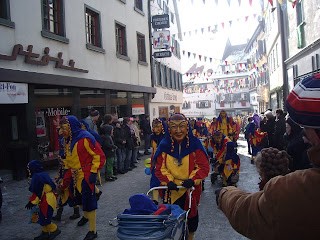
Shrove Tuesday, Alemannia Style Published on 2/16/10 6:30 AM
This is the most important day of the year in the little town, and I hadn't had the foresight to check the status of the camera batteries!! So, when at 11:15 am sharp a second storey window at the Hotel "Moor" opened and the town crier appeared to announce the impending event I had no way of documenting this and the following memorable images.
It's carnival, you see, and it's taken darn seriously here in Southern Germany. Large parts of the population take an active part in both the preparations that had started 3 months earlier, and in the series of events at actual carnival time.
Here, it's called "Fasnet", centuries old traditions in part, with a distinct local flavor particular to each and every town and hamlet.
For weeks already there had been parades, costume balls and parties on every weekend leading up to the six crazy days of Fasnet/Fastnacht/Fasching/Karneval. The name of this so-called fifth season changes with the region, whereby only the predominantly catholic parts of Germany celebrate it. There are no comparable festivities in, say, Hamburg or Leipzig.
Back at the medieval market square, meanwhile, the women come marching by single file from their early morning Shrove Tuesday gathering at a pub some ways away from the men's. All are clad in white linen lace nighties with matching white bonnets, all are singing, waving and weaving their way through the substantial crowd gathered in front of the "Moor" and all around the market square. Many of the onlookers are dressed in costume themselves, most have donned at least a funny hat, a mask or wig.
Presently, the town crier gesticulates from atop the 10-meter wooden slide attached to the window, and at the bottom the town pages get ready to receive what will be coming down. The brass band starts playing and the crowd erupts in anticipatory laughter and shouting, chanting the "official" Fasnet battle cry: Gole, Gole (pronounced go-ley, go-ley).
Soon the town crier steps away from the window and the first costumed figure comes sliding down accompanied by cheers and whistles from the crowd. The town's menfolk had been drinking and eating inside the hotel while the women had nailed the doors shut. Hence this dramatic exit.
For the next little while the men, all 320 of them dressed up in historical or plain old fun costume and all in various stages of intoxication, make their way down the slide more or less gracefully: some on their bellies, most on their behinds with hands and legs up in the air. Some actually attempt to slide down upright on their feet, others come tumbling down in bunches. Particular stunts on the way down the crowd acknowledges with more applause to the tune of more frenzied fanfare from the band.
After the last one of the formerly jailed menfolk joins the polonaise round the market square the crowd disperses for some solid or, more likely, liquid fortification to bridge the time before the next event a couple of hours later.
I for one head home to change camera batteries. The afternoon parade must not go undocumented....
This is the most important day of the year in the little town, and I hadn't had the foresight to check the status of the camera batteries!! So, when at 11:15 am sharp a second storey window at the Hotel "Moor" opened and the town crier appeared to announce the impending event I had no way of documenting this and the following memorable images.
It's carnival, you see, and it's taken darn seriously here in Southern Germany. Large parts of the population take an active part in both the preparations that had started 3 months earlier, and in the series of events at actual carnival time.
Here, it's called "Fasnet", centuries old traditions in part, with a distinct local flavor particular to each and every town and hamlet.
For weeks already there had been parades, costume balls and parties on every weekend leading up to the six crazy days of Fasnet/Fastnacht/Fasching/Karneval. The name of this so-called fifth season changes with the region, whereby only the predominantly catholic parts of Germany celebrate it. There are no comparable festivities in, say, Hamburg or Leipzig.
Back at the medieval market square, meanwhile, the women come marching by single file from their early morning Shrove Tuesday gathering at a pub some ways away from the men's. All are clad in white linen lace nighties with matching white bonnets, all are singing, waving and weaving their way through the substantial crowd gathered in front of the "Moor" and all around the market square. Many of the onlookers are dressed in costume themselves, most have donned at least a funny hat, a mask or wig.
Presently, the town crier gesticulates from atop the 10-meter wooden slide attached to the window, and at the bottom the town pages get ready to receive what will be coming down. The brass band starts playing and the crowd erupts in anticipatory laughter and shouting, chanting the "official" Fasnet battle cry: Gole, Gole (pronounced go-ley, go-ley).
Soon the town crier steps away from the window and the first costumed figure comes sliding down accompanied by cheers and whistles from the crowd. The town's menfolk had been drinking and eating inside the hotel while the women had nailed the doors shut. Hence this dramatic exit.
For the next little while the men, all 320 of them dressed up in historical or plain old fun costume and all in various stages of intoxication, make their way down the slide more or less gracefully: some on their bellies, most on their behinds with hands and legs up in the air. Some actually attempt to slide down upright on their feet, others come tumbling down in bunches. Particular stunts on the way down the crowd acknowledges with more applause to the tune of more frenzied fanfare from the band.
After the last one of the formerly jailed menfolk joins the polonaise round the market square the crowd disperses for some solid or, more likely, liquid fortification to bridge the time before the next event a couple of hours later.
I for one head home to change camera batteries. The afternoon parade must not go undocumented....
